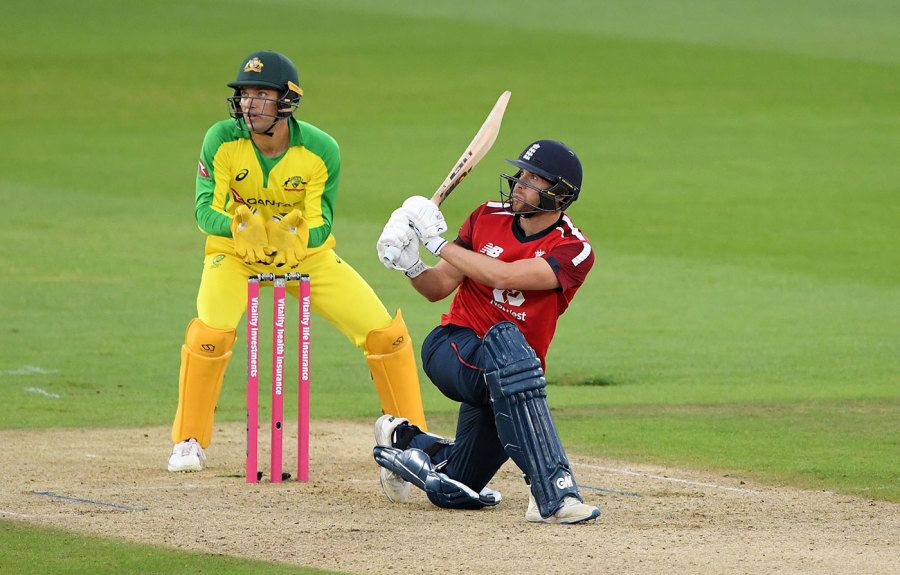England 162 for 7 (Malan 66, Buttler 44, Richardson 2-13) beat Australia 160 for 6 (Warner 58, Finch 46, Rashid 2-29) beat by two runs
Australia imploded in their first international game since March at the Ageas Bowl, falling two runs short against England despite needed 39 from the final 36 balls with nine wickets remaining in their chase.
David Warner and Aaron Finch had put on 98 for the first wicket in the space of 11 overs to break the back of the chase, before Steven Smith flew out of the blocks at No. 3. But four wickets in the space of 14 legal deliveries gave England a foothold, as Australia went 5.4 overs without a boundary.
Marcus Stoinis hit the second ball of Tom Curran’s final over for six to leave nine needed from four, but failed to get bat on the third and could only manage twos off the last three as Australia dramatically fell short.
No rust for Australia’s top three
Touring teams starting series strongly has been a theme throughout this English summer, with lengthy training camps in the build-up due to Covid-19 protocols reaping dividends for West Indies and, to an extent, Pakistan in their respective first Tests. Australia have only been in England for around 10 days, but hit the ground running with a series of intra-squad warm-up fixtures and initially showed no signs of rust in the middle.
While they were polished with the ball, it was their batsmen who particularly impressed in Australia’s first international game since March 13. Warner and Finch fell two short of a century stand for the first wicket in just 11 overs, and Smith, in at No. 3, pulled the first ball he faced – clocked at 94mph/151kph out of Mark Wood’s hand – for four.
Middle-order muddle
Despite their top three’s fine form, Australia’s innings began to turn into a replica of their failed chase of 159 against South Africa in February as a flurry of wickets exposed the weakness in their middle order. On that occasion, they didn’t manage to score a single boundary in the last 29 balls, falling 12 short despite having needed only 37. Here, there were no fours after the 12th over, with a single six in both the 14th and 20th.
Adil Rashid took two wickets in his final over with 39 needed from 36 balls, Smith holing out to deep midwicket and Glenn Maxwell skewing the last ball Rashid bowled to short cover, before Morgan gambled by bringing Jofra Archer – in his first limited-overs international since the World Cup final – and Wood back early to bowl out. His bet paid off, as both took wickets: Warner played on via the bottom edge, while Wood caught Alex Carey flat-footed to clean him up.
That meant Stoinis – discussed only as a top-order option by Justin Langer two days out from this series – had a job to do at No. 5, but consistently failed to find the boundary. He whacked the second ball of the final over over wide long-off, but could not repeat the trick.
Buttler’s flying start
Questions will continue to be asked right through the build-up to next year’s T20 World Cup as to where Jos Buttler should bat for England. Thirty-three of his last 33 T20 innings have been as an opener, a run that stretches back to April 2018, but such is his ability as a 50-over finisher and England’s plethora of top-order options, there remains a school of thinking that he should bat in the middle.
He served a reminder of why he has been used at the top in this game, racing to 41 from 23 balls at the end of the Powerplay and making a mockery of Aaron Finch’s ploy to use Ashton Agar against him up front. But with England’s innings falling away after his dismissal, holing out to deep midwicket, the debate will doubtless rumble on.
The two sides of Malan
It seems remarkable that someone can make eight half-centuries in 14 T20I innings without necessarily being in England’s best XI, but that is the situation Dawid Malan is in. His efforts in their series against Pakistan summed up the conundrum. Malan takes 10 balls to nudge his strike rate above 100; it isn’t a problem when he faces 40 or so in all, accelerating after getting set, as demonstrated in the second game, but innings of 23 off 23 and 7 off 8 were evidence of the issue.
It was again exemplified here, despite winning the match award: after hitting his first ball for four, Malan nudged his way to 10 off 10 to stall after England’s fast start. Suddenly, risks were required at the other end, and Buttler, Tom Banton and Morgan were all out in the middle overs taking on boundary options.
Malan carted the 13 balls he faced from Adam Zampa for 33 and finished with 66 off 43; it would be harsh to pin all of England’s batting struggles on him. But Morgan as a captain loves players batting for the team and maintaining an aggressive mindset throughout; perhaps counterintuitively, Malan’s innings might have demonstrated why he is not a certainty in England’s strongest team.
